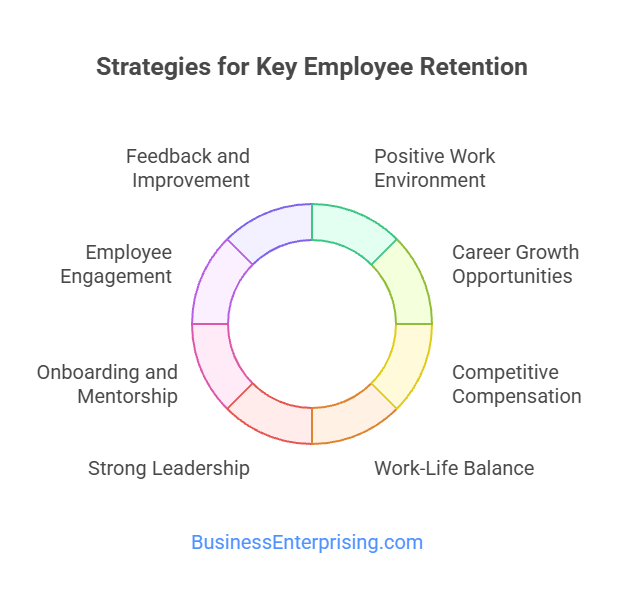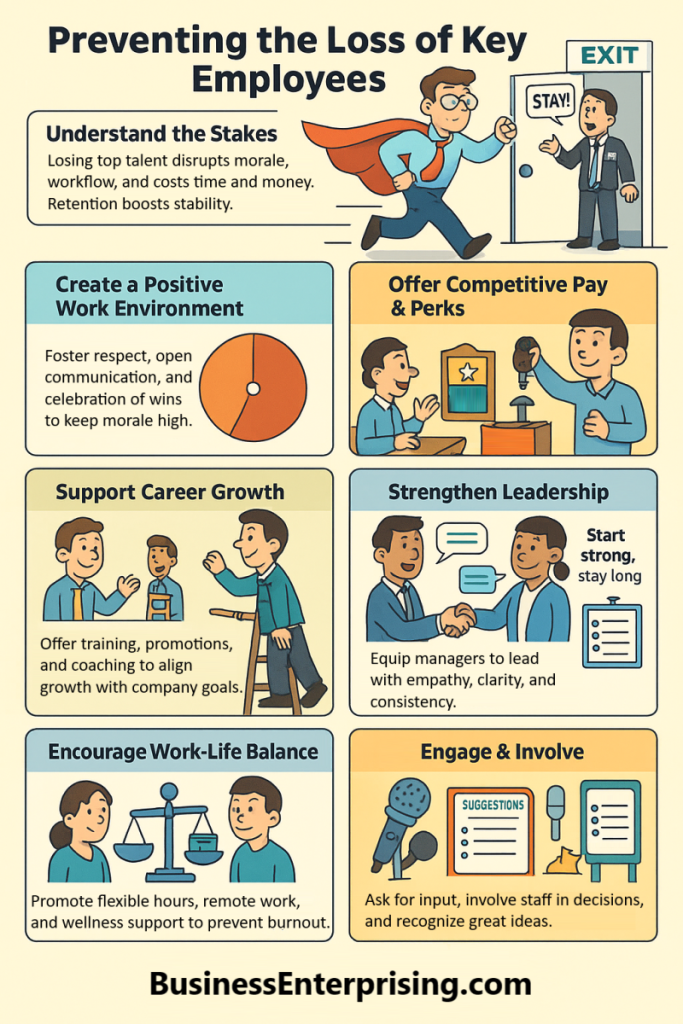 The loss of key employees can be detrimental to a company’s success and stability. These individuals often hold critical knowledge, skills, and relationships that are not easily replaced. Consequently, preventing the loss of key employees is a top priority for many organizations. By implementing effective retention strategies, companies can ensure that their most valuable talent remains engaged, motivated, as well as committed to the organization. Let’s explore various methods that companies can use to retain key employees and foster a loyal and productive workforce.
The loss of key employees can be detrimental to a company’s success and stability. These individuals often hold critical knowledge, skills, and relationships that are not easily replaced. Consequently, preventing the loss of key employees is a top priority for many organizations. By implementing effective retention strategies, companies can ensure that their most valuable talent remains engaged, motivated, as well as committed to the organization. Let’s explore various methods that companies can use to retain key employees and foster a loyal and productive workforce.
Understanding the Importance of Employee Retention
Preventing the loss of key employees is vital for maintaining continuity, preserving institutional knowledge, and sustaining high levels of productivity. When key employees leave, the company faces the costs associated with recruiting, hiring, and training new staff. Additionally, the departure of key employees can disrupt team dynamics and negatively impact morale. Therefore, investing in retention strategies not only helps to minimize these costs but also enhances overall organizational stability.
Creating a Positive Work Environment
One of the most effective ways to retain key employees is by creating a positive work environment. Employees who feel valued, respected, and supported are more likely to remain with the company. A positive work environment fosters collaboration, innovation, and job satisfaction, all of which contribute to employee retention. To create such an environment, companies should prioritize open communication, encourage feedback, and promote a culture of inclusivity and respect.
Moreover, recognizing and celebrating employee achievements can significantly boost morale and engagement. When employees feel that their contributions are acknowledged and appreciated, they are more likely to develop a strong sense of loyalty to the organization. Implementing regular recognition programs and celebrating milestones can reinforce a positive work culture and enhance employee satisfaction.
Providing Opportunities for Career Growth
Career growth and development opportunities are crucial factors in employee retention. Key employees often seek to advance their careers and expand their skill sets. Therefore, providing opportunities for professional growth can help retain top talent. Companies should invest in training as well as development programs that enable employees to acquire new skills and also advance their careers within the organization.
Additionally, offering clear career progression paths and promoting from within can demonstrate a commitment to employee growth. Regularly discussing career goals and development plans with employees can help align their aspirations with the company’s objectives. By supporting employees’ career ambitions, companies can foster a sense of purpose and loyalty.
Offering Competitive Compensation and Benefits
Competitive compensation and benefits packages are essential in preventing the loss of key employees. While salary is an important consideration, it is not the only factor that influences employee retention. Comprehensive benefits packages that include health insurance, retirement plans, paid time off, and wellness programs can enhance job satisfaction and loyalty. Additionally, offering performance-based incentives and bonuses can reward employees for their contributions and motivate them to stay with the company.
Regularly reviewing and adjusting compensation and benefits packages to remain competitive within the industry is crucial. Conducting salary benchmarking and employee satisfaction surveys can provide valuable insights into what employees value most. By demonstrating a commitment to employee well-being and also offering attractive compensation and benefits, companies can strengthen their retention efforts.
Enhancing Work-Life Balance
Work-life balance is a critical factor in employee retention. Employees who feel overwhelmed by work responsibilities and struggle to balance their personal and professional lives are more likely to seek employment elsewhere. Companies should promote a healthy work-life balance by offering flexible work arrangements, such as remote work options and flexible scheduling. Encouraging employees to take regular breaks and use their vacation time can also help prevent burnout and enhance job satisfaction.
Moreover, supporting employees’ well-being through wellness programs and resources can demonstrate a commitment to their overall health and happiness. Providing access to mental health resources, fitness programs, and stress management tools can contribute to a positive work environment and improve employee retention.
Fostering Strong Leadership and Management
Effective leadership and management play a crucial role in employee retention. Employees who trust and respect their managers are more likely to remain engaged and committed to the organization. Companies should invest in leadership development programs to ensure that managers possess the skills and qualities needed to lead effectively. This includes training in communication, conflict resolution, and performance management.
Encouraging open communication between managers and employees can help address concerns and prevent misunderstandings that may lead to dissatisfaction. Providing regular feedback and support, as well as recognizing employees’ contributions, can reinforce a positive relationship between managers and their teams. By fostering strong leadership and management, companies can enhance employee engagement and retention.
Implementing Effective Onboarding and Mentorship Programs
A strong onboarding process and mentorship programs can significantly impact employee retention. Effective onboarding helps new employees integrate into the company culture, understand their roles, and build relationships with their colleagues. Providing a comprehensive onboarding program that includes orientation, training, and support can set the foundation for a positive employee experience.
Mentorship programs can further enhance employee retention by offering guidance and support from experienced colleagues. Mentors can help new employees navigate the company, develop their skills, and achieve their career goals. By fostering a sense of belonging and providing ongoing support, mentorship programs can improve employee satisfaction and retention.
Encouraging Employee Engagement and Involvement
Employee engagement and involvement are key factors in retention. Engaged employees are more likely to be committed to the company’s success and less likely to seek opportunities elsewhere. Companies should actively seek ways to involve employees in decision-making processes and encourage their input on company initiatives. This can be achieved through regular meetings, surveys, and open forums where employees can share their ideas and feedback.
Additionally, creating opportunities for employees to participate in company projects and initiatives can enhance their sense of ownership and investment in the company’s success. By involving employees in meaningful ways and recognizing their contributions, companies can foster a strong sense of engagement and loyalty.
Conducting Exit Interviews and Using Feedback
Understanding the reasons behind employee departures can provide valuable insights into areas for improvement. Conducting thorough exit interviews with departing employees can help identify patterns and common issues that may be contributing to turnover. Gathering feedback from current employees through surveys and regular check-ins can also help identify potential concerns before they lead to departures.
Implementing changes based on feedback demonstrates that the company values its employees’ opinions and is committed to continuous improvement. By actively seeking and acting on feedback, companies can create a more engaging and satisfying work environment that enhances retention.
Preventing the loss of key employees requires a strategic and holistic approach. By creating a positive work environment, providing opportunities for career growth, offering competitive compensation and benefits, enhancing work-life balance, fostering strong leadership, implementing effective onboarding and mentorship programs, encouraging employee engagement, and using feedback to drive improvements, companies can build a loyal and motivated workforce.
Conclusion
Investing in employee retention is essential for achieving long-term success and stability. Companies that prioritize the well-being and satisfaction of their employees are better positioned to retain top talent and drive organizational growth. By implementing these strategies, businesses can create an environment that attracts and retains key employees, ultimately contributing to their overall success and sustainability.


